
The European Union and China are the largest trading partners. It has been 50 years since the establishment of diplomatic relations between the parties. This would seem to be a powerful obstacle for Brussels to deliberately complicate relations with Beijing. Nevertheless, the European bureaucracy, relying on notifications from the special services, arrested several people suspected of trying to bribe members of the European Parliament. And Brussels pointed an accusing finger at Huawei, the Chinese technology giant.
Raids on Chinese “agents of influence” were conducted earlier in Britain. But the attraction of the Chinese market is apparently so great that the leaders of the EU and Britain visited China and tried to settle the scandals quietly.
The question is, will it be possible in this jubilee year? According to The Financial Times, Brussels expected Chinese President Xi Jinping to attend the EU–China summit. But he ignored the invitation. China will be represented at the meeting by a less significant figure, Premier of the State Council Li Qiang.
Brussels is disappointed, hoping that Beijing, angered by the high customs duties on Chinese imports imposed by US President Donald Trump, as well as his administration’s harsh statements against Beijing, would warm to the European Union. This has not happened, although behind-the-scenes negotiations about the summit are continuing.
The tension between the EU and China is caused by a number of factors. First, the EU accuses China of supporting Russia in the conflict with Ukraine. Beijing, through the mouths of Foreign Minister Wang Yi and official representatives of the diplomatic department, rejects this accusation, referring to the peace plan put forward jointly by China and Brazil. This plan provides for a settlement based on the principles enshrined in the UN Charter, respect for the territorial integrity of states and consideration of the interests of both sides in ensuring security.
And in the field of economic relations, the European Union is also behaving harshly. He imposed tariffs on imports of Chinese electric vehicles, citing the fact that their production is subsidized by the state. EU officials say China, which had a trade surplus of 304.5 billion pounds with the EU last year, does not want to balance trade by cutting subsidies and reducing barriers for foreign companies doing business in the world’s second largest economy after the United States. “Relations between us are icy,” a high–ranking EU diplomat told the newspaper.
A number of EU officials negatively assess the appointment of Lu Shae, the former Chinese ambassador to France, who became famous for his vivid and overly outspoken speeches from the point of view of Paris, as Beijing’s special representative for European affairs. For example, he questioned Ukraine’s claims to Crimea and expressed doubt that Lithuania, Latvia and Estonia are truly sovereign states. And today, Lou doesn’t go into his pocket for a word. He said that the EU, which is being subjected to increasingly high tariff penalties from Trump, should look to China as a safe haven in a sea of volatility.
But the European bureaucrats were not at all impressed by this maxim. On the contrary, Brussels fears that China, whose exports are being hindered by Washington, will flood Europe with its goods. Last Friday, they launched an anti-dumping investigation against the import of Chinese adipic acid, which is used for the production of nylon. And at the end of last year, the same measure was taken against Chinese imports of sweet corn and metal screws.
But potentially the most sensitive blow to the EU’s relations with China could be the arrests of European citizens who allegedly bribed European parliamentarians in the interests of Huawei Corporation. According to the AP news agency, the arrests were reported by Belgian investigators. Media reports indicate that the lobbyists “worked” with current and former members of the European Parliament to promote the commercial interests of the Chinese telecommunications giant in Europe. The investigators’ office confirmed that Huawei could have benefited from the bribes. Approximately 100 police officers conducted searches in Belgium and Portugal. The magistrate in charge of the investigation also appealed to the European Parliament with a request to seal the offices where the deputies’ assistants work, who are suspected. One person was arrested in France. The defendants are charged with corruption and forgery of documents.
The Chinese corporation itself did not enter into a controversy with law enforcement officers. She stated that she takes the opinion of her accusers seriously, as she does not tolerate corruption in her ranks.
In fact, EU law enforcement officers who link bribes to a Chinese firm cannot claim to be the most vigilant fighters for moral purity in Western Europe. In September 2023, as The Times reported, an aide to a member of the House of Commons who allegedly worked for Chinese intelligence was detained in the UK.
